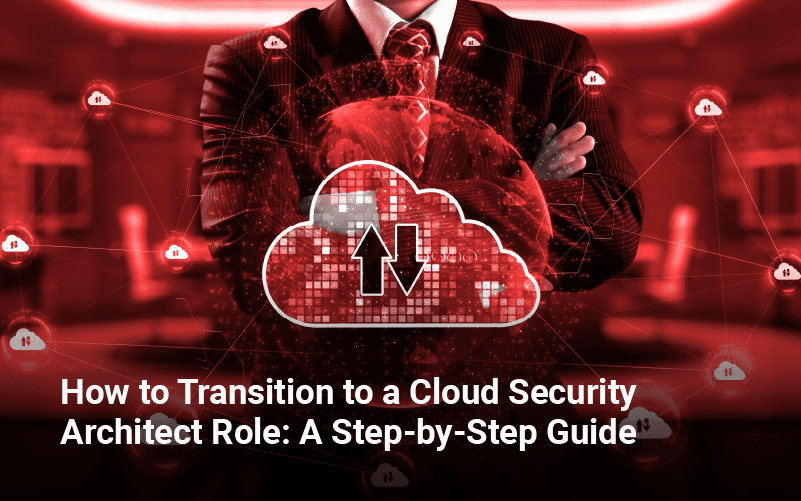The rapid adoption of cloud computing has necessitated a rise in demand for capable cybersecurity professionals, notably Cloud Security Architects. This role is crucial in safeguarding organizations’ sensitive data and applications as they migrate to the cloud. The global cloud security market is presumed to grow significantly, reaching USD 62.9 billion by 2028, with a CAGR of 9.1% during the forecast period (Marketsandmarkets, 2023). If you are intrigued by the challenges and rewards of this position, this guide will provide you with a roadmap to transition into a Cloud Security Architect.
Understanding the Role of a Cloud Security Architect:
A Cloud Security Architect is accountable for designing, implementing, and maintaining secure cloud environments. Their primary duties include:
- Risk Assessment and Management: Identifying, assessing, and mitigating security risks associated with cloud deployments.
- Security Architecture Design: Developing and implementing robust security architectures that align with organizational security policies and industry best practices.
- Security Controls Implementation: Configuring and deploying security controls, including firewalls, intrusion detection systems, and encoding, to safeguard cloud resources.
- Incident Response Planning: Developing and executing incident response strategies to minimize the effect of security breaches.
- Compliance and Regulatory Adherence: Ensuring compliance with relevant security standards and regulations, including GDPR, HIPAA, and PCI DSS.
Essential Skills and Certifications
To successfully transition into a Cloud Security Architect role, you’ll need a solid foundation in the following areas:
Core Security Skills:
- Network security fundamentals
- Cryptography
- Threat modeling
- Incident response
- Risk assessment
Cloud-Specific Skills:
- Proficiency in at least one key cloud platform (AWS, Azure, GCP)
- Understanding of cloud security controls (e.g., IAM, encryption, key management)
- Knowledge of cloud-native security principles and best practices
- Familiarity with cloud security tools and technologies (e.g., SIEM, SOAR, WAF)
Certifications that can substantially boost your career prospects include:
- Certified Cloud Security Professional (CCSP)
- Certified Information Systems Security Professional (CISSP)
- AWS Certified Security Specialty
- Azure Security Engineer Associate
- Google Cloud Certified Professional Cloud Security Engineer
Building Practical Experience
While certifications are valuable, hands-on experience is equally important. Here are some strategies to gain practical experience:
- Work on Cloud Security Projects: Seek opportunities to contribute to cloud security projects within your organization or through open-source initiatives. This will let you utilize your knowledge and learn from experienced professionals.
- Participate in Security Audits and Assessments: Volunteering for security audits and assessments can provide valuable insights into identifying and mitigating vulnerabilities.
- Contribute to Incident Response: Participating in incident response activities will help you understand how to respond effectively to security breaches.
- Implement Security Controls: Gain hands-on experience in configuring and deploying security controls in cloud environments.
- Leverage Online Labs and Certifications: Many cloud providers offer free or low-cost labs that allow you to practice your skills. Additionally, certifications often come with hands-on labs that can enhance your practical knowledge.
Networking and Building Relationships
Networking is fundamental for career advancement in the field of cloud security. Attending industry conferences and webinars, participating in online communities and forums, connecting with experts on LinkedIn, and joining local meetups and user groups can help you figure out valuable relationships with professionals in the field. According to HubSpot, 85% of jobs are fulfilled through networking (Apollo Technical,2024). Seeking mentorship from experienced Cloud Security Architects can provide counseling and support as you navigate your career path.
Showcasing Your Skills and Experience
To land your dream job as a Cloud Security Architect, you need to showcase your skills and experience effectively. Here are some tips:
- Update Your Resume: Highlight your cloud security skills, certifications, and relevant experience. Use keywords that recruiters and hiring managers are likely to search for. Ensure your resume is clear and concise and highlights your most relevant skills.
- Build a Robust Online Presence: Build a professional LinkedIn profile and actively engage in cloud security discussions on social media. 40% of recruiters say that they have shortlisted a candidate considering their LinkedIn profile alone (Harvard Business Review, 2019). It will help you in connecting with potential employers and showcase your expertise.
- Prepare for Interviews: Practice common cloud security interview questions and be ready to discuss your technical skills, problem-solving abilities, and experience. Remember, first impressions matter. Prepare a strong introduction and be ready to articulate your skills and proficiency clearly and concisely.
Transitioning to a Cloud Security Architect role requires an amalgamation of technical skills, practical experience, and strong networking abilities. Following the steps outlined in this guide, you can position yourself for success in this exciting and in-demand field. Continuous learning and adaptation are essential to staying ahead in the ever-evolving industry of cloud security.
How Can EC-Council University help with this?
EC-Council University offers a comprehensive Master of Science in Cybersecurity program specializing in Cloud Security Architecture. This program provides in-depth knowledge of cloud security concepts, including security architecture design, cloud security controls, threat modeling, incident response, and compliance. By pursuing this specialization, you’ll be well-prepared to take on challenging roles in cloud security and contribute to protecting critical infrastructure.
References:
- Marketsandmarkets. (2023). Cloud Security Market. https://www.marketsandmarkets.com/Market-Reports/cloud-security-market-100018098.html
- Apollo Technical. (June 24, 2024). 15 Important Networking Statistics Everyone Should Know. https://www.apollotechnical.com/networking-statistics/
- Harvard Business Review. (2019). Hiring and recruitment. https://hbr.org/2019/05/your-approach-to-hiring-is-all-wrong








